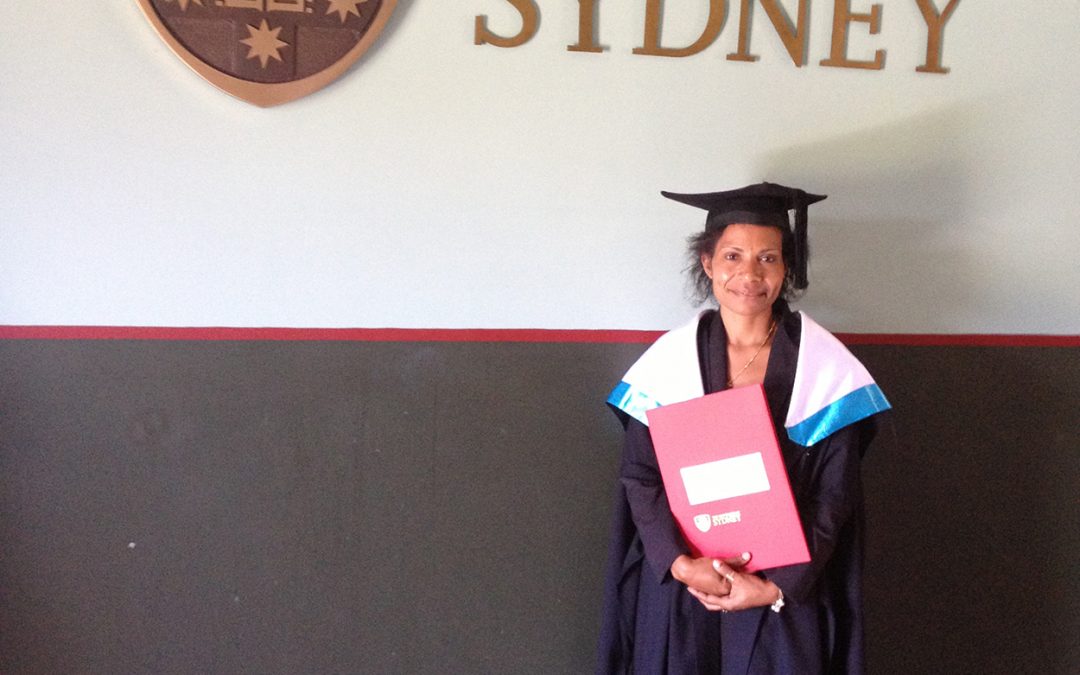As an Infection Control Coordinator at the ANGAU Memorial Hospital in Lae, Betty Mundua is playing a leading role in promoting good health and hygiene practices as part of the provincial response to COVID-19.
A clinical nurse by profession and an Australia Awards alumna, Betty is responsible for the training of health care workers in line with infection control measures, conducting infection control audits and surveillance and the hospital’s waste management and hygiene.
Betty has delivered training for the hospital staff with a focus on the World Health Organization’s My 5 Moments for Hand Hygiene principles – key to preventing COVID-19 transmission.
She is also sharing this knowledge beyond the hospital wards through community-based outreach. So far, Betty has delivered training at 15 different locations across Morobe Province, including sessions for health personnel in Bulolo and Finschhafen, members of the Lutheran Church who operate health centres and truck drivers who work along the Highlands Highway.
Betty’s contribution complements Australia’s PGK1.9 million funding to the Morobe Provincial Health Authority to fight the pandemic.
Betty’s work builds on some 20 years’ experience as a nurse in several provinces including East New Britain where she first trained, West New Britain, the National Capital District and now Morobe.
By the time she was a special care nurse at ANGAU Memorial Hospital in 2011, and with a decade’s professional experience under her belt, Betty decided to apply for an Australia Awards Scholarship to extend her clinical and academic skills. She was accepted at the University of Sydney where she completed a two year course in Master of Clinical Nursing.
Betty is one of nearly 200 Papua New Guineans who have been awarded a long-term Australia Awards Scholarship in health since 2012. She names leadership, training and patient care as areas she was keen to develop through further studies.
‘I was given the opportunity in 2015 to work in infection, prevention and control. This is where I was able to demonstrate my capabilities in leadership, training, and improving patient care,’ she recalls.
‘The challenges faced were very stressful, because the field was new to me but eventually I got through and as time passed I saw myself as a change agent, influential and innovative in the prevention of infections.’
Betty accepts that the challenges of delivering high-quality healthcare, especially during a global pandemic, are significant. But she is confident that with the right investments, particularly in training for healthcare personnel, the future is bright.
‘The foundation of improving the healthcare system is that firstly the workforce must be equipped with the necessary resources such as knowledge, skills, and leadership,’ she says.
This sentiment has been strongly expressed by healthcare personnel attending Betty’s training sessions. Betty explains that even a basic understanding of COVID-19 was initially lacking among some healthcare personnel. She is pleased she has been able to play her part in building their knowledge.
‘Training I’ve run has given healthcare personnel a clear understanding of the disease and infection control measures. This is helping to remove fear and stigmatisation towards patients who may come in with high fever and cough.’
To that end, Betty encourages fellow Papua New Guineans working in the health sector to consider furthering their skills and knowledge by taking on an Australia Awards Scholarship.
‘We need agents of change in the healthcare system,’ she says.
Australia Awards Scholarships are prestigious international awards offered by the Australian Government to Papua New Guinea’s current and future leaders.
